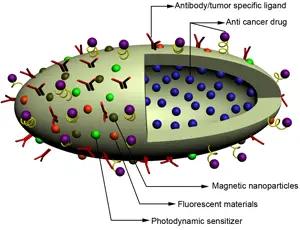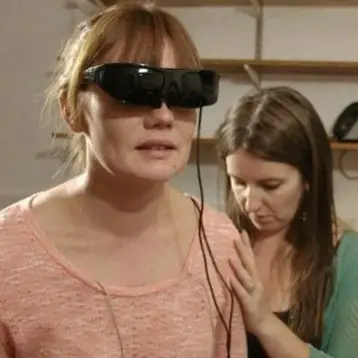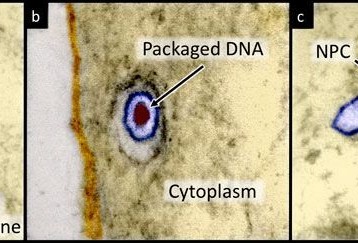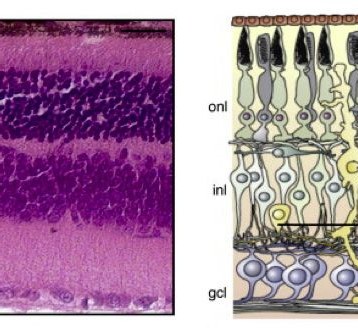|
Fruit flies – just like humans – feel sleepy after a big meal. Now, Paul Shaw from Washington University showed that being hungry may have positive effects, providing a way to stay awake without feeling groggy or mentally challenged. “The major drugs we have to either put people to sleep or keep them awake are all targeted to a small number of pathways in the brain, all of them having to do with neurotransmission,” explained Shaw.
Scientists know that the ability to resist the effects of sleep loss are linked to a protein that helps the fruit fly brain manage its storage and use of lipids, a class of molecules that includes fats such as cholesterol and fat-soluble vitamins such as A and D. “Modifying lipid processing with drugs may provide us with a new way of tackling sleep problems that is more effective or has fewer side effects,” Shaw said.
The findings, appearing in PLoS Biology, add a new perspective to the complex relationship between sleep and dietary metabolism. Scientists recognized about a decade ago that inadequate sleep results in obesity and contributes to the development of diabetes and coronary disease. Until now, no one had connected genes linked to lipids with regulation of the need for sleep.
Several researchers – not involved in this study – commented on these recent findings.
Clay Semenkovich from Washington University, a lipid expert, said that the results fit into a growing awareness that organisms use lipids for much more than energy storage. “It’s becoming apparent that fats serve as signaling molecules in a number of contexts. If you identify the appropriate lipids involved in sleep regulation and figure out how to control them, you may be able to decrease suffering associated with loss of sleep or the need to stay awake,” he said.
The fruit flies were used as models for sleep deprivation effects in higher organisms, since it is not accustomed to experiment with humans (when dealing with sleep and food deprivation). Shaw is among the first to prove that flies enter a state comparable to sleep, showing that they have periods of inactivity where greater stimulation is required to rouse them. Like humans, flies deprived of sleep one day will try to make up for it by sleeping more the next day, a phenomenon referred to as sleep debt. Sleep-deprived flies also perform poorly on a simple test of learning ability.
In the few cases when experiments involved human volunteers, studies have shown that fasting leads to less sleep. More recent research has also shown that starvation can change the activity levels of genes that manage storage and use of lipids. Since Shaw’s lab previously demonstrated that fruit flies with a mutation in a timekeeping gene accumulate sleep debt, they wished to pursue this subject further.
Matt Thimgan, a postdoctoral research associate involved in this study, reports in the new paper that starving fruit flies spent more time awake, and starving fruit flies with the timekeeping gene mutation could survive up to 28 hours without sleep.
The study defines two markers of sleep debt: an enzyme in saliva and the flies’ ability to learn to associate a light with an unpleasant stimulus. The researchers tested the starving, sleepless flies for both markers, and the two tests showed that the starving flies were not getting sleepy. “From an evolutionary perspective, this makes sense,” Thimgan says. “If you’re starving, you want to make sure you’re on the top of your game cognitively, to improve your chances of finding food rather than becoming food for someone else.”
Previous studies found an effect similar to starvation in fruit flies where a gene called Lipid Storage Droplet 2 (LSD2) was disabled. After sleep deprivation, flies with the LSD2 mutation were less likely to sleep for longer periods of time and continued to score high on the learning test. “LSD2 mutants seem to constantly rotate lipids through their storage depot in cells, putting them in and moving them out very quickly,” Thimgan says. “Disabling LSD2 appears to make it hard for cells to hold on to lipids and use them properly, and we think this impairs brain cells’ ability to respond to sleep deprivation.”
TFOT has covered another research study that induced from fruit flies to higher mammals. Scientists from the Hebrew University of Jerusalem, Israel, found the way in which our biological system knows to operate on a 24-hour cycle. Another related TFOT story concerns the dangers of sleep deprivation – which can double the chances of dying from a cardiovascular event.
For more information about fruit flies, food deprivation, and effects on sleeping habits, see the official press release.










